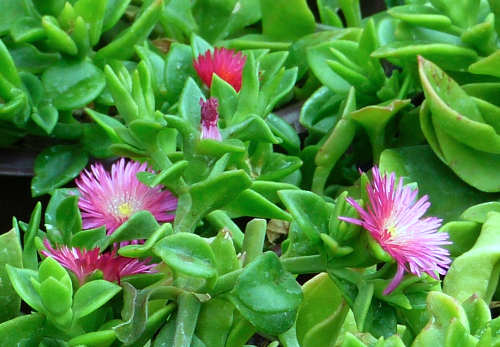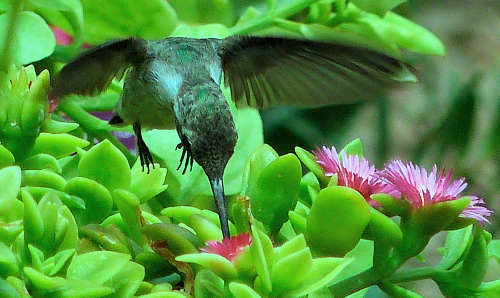Growing Mesembryanthemum cordifolium:
Baby Sun Rose
Description
Form: A mat-forming, succulent growing from a woody base (subshrub).
Lifespan: 2-3 years.
Leaf retention: Evergreen in regions without freezes.
Growth rate: Rapid.
Mature Size: 6" (15cm) high and 12-24" (30-60cm) wide.
Flowers: Dozens of bright pink to purple-red, very narrow, petals surround a center of yellow stamens. The flowers open in the morning, close at night, and may remain closed on cloudy days.
Bloom: Spring to fall.
Fruit: Tiny, green, apple-like, containing four seeds.
Leaves: Medium green, heart-shaped to oval, succulent, smooth.
Stems: Rooting occurs where stem nodes touch moist soil.
Roots: Fibrous, often fleshy. They are subject to root rot in continually moist soil.
Wildlife: The flowers attract bees, butterflies, and even hummingbirds when the plant is more than 3' (1m) off the ground.
Toxic / Danger: No.
Origin: South Africa.
Form: A mat-forming, succulent growing from a woody base (subshrub).
Lifespan: 2-3 years.
Leaf retention: Evergreen in regions without freezes.
Growth rate: Rapid.
Mature Size: 6" (15cm) high and 12-24" (30-60cm) wide.
Flowers: Dozens of bright pink to purple-red, very narrow, petals surround a center of yellow stamens. The flowers open in the morning, close at night, and may remain closed on cloudy days.
Bloom: Spring to fall.
Fruit: Tiny, green, apple-like, containing four seeds.
Leaves: Medium green, heart-shaped to oval, succulent, smooth.
Stems: Rooting occurs where stem nodes touch moist soil.
Roots: Fibrous, often fleshy. They are subject to root rot in continually moist soil.
Wildlife: The flowers attract bees, butterflies, and even hummingbirds when the plant is more than 3' (1m) off the ground.
Toxic / Danger: No.
Origin: South Africa.
Cultivation and Uses
USDA hardiness zones: 9-10. This plant will die to the ground in hard freezes.
Heat tolerant: Yes.
Drought tolerant: Yes.
Sun: Full sun.
Planting: Avoid areas with foot traffic. This plant can be grown in containers that are very well draining.
Soil: Well draining, dry, low in organic content, pH 6.1-7.8 (slightly acidic to slightly alkaline).
Water after becoming established: At least once a month. More frequent water will maintain its appearance in the hottest months of the year, but is not necessary for survival. Allow the soil to dry out between waterings. Do not overwater.
Mulch: No. The soil must dry quickly.
Prune: Only if dead sections appear.
Litter: This plant dies after a few years and may be replaced by new seedlings.
Propagation: Stem tip cuttings that include a leaf node, or seed sown in summer.
Uses: Ornamental ground cover, weed suppression, erosion control on mild slopes.
USDA hardiness zones: 9-10. This plant will die to the ground in hard freezes.
Heat tolerant: Yes.
Drought tolerant: Yes.
Sun: Full sun.
Planting: Avoid areas with foot traffic. This plant can be grown in containers that are very well draining.
Soil: Well draining, dry, low in organic content, pH 6.1-7.8 (slightly acidic to slightly alkaline).
Water after becoming established: At least once a month. More frequent water will maintain its appearance in the hottest months of the year, but is not necessary for survival. Allow the soil to dry out between waterings. Do not overwater.
Mulch: No. The soil must dry quickly.
Prune: Only if dead sections appear.
Litter: This plant dies after a few years and may be replaced by new seedlings.
Propagation: Stem tip cuttings that include a leaf node, or seed sown in summer.
Uses: Ornamental ground cover, weed suppression, erosion control on mild slopes.
Comments
This plant is a member of the Ice Plant family (Aizoaceae). Its scientific synonym is Aptenia cordifolia. Another common name is Heartleaf Iceplant.
The most commonly sold cultivar is 'Red Apple', a hybrid of Mesembryanthemum cordifolium and M. haeckelianum.
This plant is invasive and quite vigorous near wetlands and moist areas. In California it is considered an invasive weed.
Do you have additional information or a different experience for these plants that you would like to share? Email info@GardenOracle.com. All contributions are welcome and appreciated.
This plant is a member of the Ice Plant family (Aizoaceae). Its scientific synonym is Aptenia cordifolia. Another common name is Heartleaf Iceplant.
The most commonly sold cultivar is 'Red Apple', a hybrid of Mesembryanthemum cordifolium and M. haeckelianum.
This plant is invasive and quite vigorous near wetlands and moist areas. In California it is considered an invasive weed.
Do you have additional information or a different experience for these plants that you would like to share? Email info@GardenOracle.com. All contributions are welcome and appreciated.


Latest update: September, 2024
© 2008-2026 by GardenOracle.com

